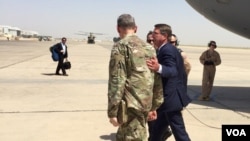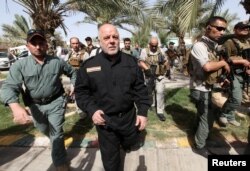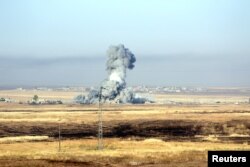The United States will deploy 560 more troops to Iraq to help shape the fight to retake Mosul from Islamic State, following the recent seizure of a key airbase near the city by Iraqi forces.
Defense Secretary Ash Carter made the announcement Monday during a visit to Baghdad. He said the additional troops will be sent to support the newly retaken Qayyarah Airfield West, about 60 kilometers south of Mosul, which will serve as a logistics and air hub for the coalition.
"The point of seizing that airfield is to be able to establish a logistics and air hub in the immediate vicinity of Mosul," Carter told reporters before entering Iraq.
General Sean MacFarland, commander of coalition forces in Iraq, told reporters Monday in Baghad that the "preponderance" of those troops will be based in Qayyarah West, with the rest pushing supplies into the airfield from other locations. Carter said the troops would arrive in "days and weeks, both months."
"They've already gotten the warning orders," MacFarland said.
The seizure of the airbase by Iraqi forces marked the completion of the coalition's "first 10 plays" toward defeating Islamic State, said a senior U.S. defense official. "Qayarrah was definitely the big fish on that list because of its strategic importance," the senior official said, speaking on the condition of anonymity.
In his fourth trip to Iraq as defense secretary, Carter met with Iraqi Prime Minister Haider al-Abadi and Defense Minister Khaled al-Obeidi in Baghdad, and will speak by phone with Masoud Barzani, the president of Iraqi Kurdistan. Carter said Abadi reaffirmed to him in their meeting that he wanted to accomplish the Mosul offensive this year.
What were the 10 plays?
Back in December and January, U.S. President Barack Obama and Carter laid out 10 strategic goals — some of them geographical, some of them functional — that needed to occur before Iraqi security forces, Kurdish Peshmerga fighters and the Syrian counter-IS forces could retake Raqqah and Mosul, Islamic State's de-facto capital in Syria and largest stronghold in Iraq.
The recapturing of Hit, Rupta and Ramadi in Iraq were key steps toward splitting the Iraq and Syria battlefields, said one senior defense official. Establishing a staging base in Makhmour has been considered a crucial step in encircling Mosul.
On the Syrian side, Shaddadi, located on the road from Raqqah to Mosul, also was deemed critical so that Islamic State's core was "severed in half," Carter said, stifling movement of people and supplies between the two cities.
The envelopment of Manbij by U.S.-trained opposition forces has taken a "hub" for Islamic State foreign fighters, Col. Chris Garver, the coalition spokesman based in Baghdad, told reporters last month.
Starting the train-and-equip program within northeast Syria was another of the 10 plays, said a second defense official.
Mosul fight shaping up
The plan to envelop Mosul in the south required two prongs: Makhmour to the southeast and Qayyarah to the southwest. A small number of U.S. forces have conducted a brief site survey at the airbase, but they did not remain onsite.
The Iraqi security forces' push to retake Qayyarah was Iraq's largest armor maneuver since the Iraqi army invaded Kuwait, which officials say displayed a level of sophistication not yet seen in the war.
At the same time, two Peshmerga brigades equipped (and some even being paid for) by the U.S. are completing the encirclement from the north.
"Those two prongs are as important as the prongs coming from the south," Carter said.
During his last trip to Iraq, Carter announced the U.S. will provide $415 million in financial aid to Kurdish forces, through Baghdad, after the Kurdish economy took a hit with the worldwide drop in oil prices.
A senior defense official confirmed the U.S. has completed its initial goal of training 12 brigades for the Mosul fight, which commanders say is the number needed for the massive battle.
U.S. looking to do more
But while that goal has been reached, U.S. official say additional training might be needed for those groups. For example, when the fight for Ramadi involved layer after layer of improvised explosive devices, U.S. forces gave counter-IED training to soldiers previously trained in other skills.
U.S. technical engineering support likely will be needed for bridging because Islamic State has blown up the bridges into Mosul, and police training might also be needed to help stabilize the city once Islamic State has been thrown out.
Carter said he will talk with Abadi about "a whole host of enablers" that have proven effective against the enemy, such as air support, equipment, supplies and help with logistics.
"We will provide more if and when the Iraqi Security Forces can make good use of them, and Prime Minister Abadi requests them," Carter said.






